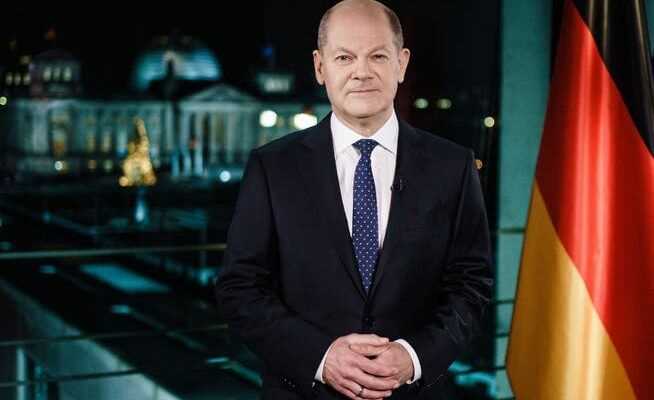The speech by the German Chancellor on New Year’s Eve lacked credibility. Scholz looked back on a difficult year for the Federal Republic and painted over the social breakpoints.
Chancellor Olaf Scholz after recording his TV address on Thursday.
In his first New Year’s address as German Chancellor, Olaf Scholz seemed to rely on the magic of repetition. It used to be said that repetition does not make the untruth truer. Today, however, behavioral psychology knows that if the same theses are repeated over and over again, the audience will at some point believe them – almost regardless of the actual truth content. Populists take advantage of this. Anti-vaccination campaigns could also create uncertainty around the world.
Now Scholz really has nothing populist about him, but has been repeating a questionable statement for weeks. Although some people would see it differently, society in Germany is not divided, he said in his New Year’s address, which was recorded on Thursday in the Berlin Chancellery. Two weeks ago Scholz had already announced in Basta style from ex-Chancellor Gerhard Schröder: “At the moment there is a lot of talk about the alleged split in our society. In addition, I state: Our society is not divided. “
However, there are some indications that society is more divided than ever since German reunification. Despite countless appeals from politicians and scientists, around ten million citizens have not been vaccinated against the corona virus. Because of the 2-G rule, they can only participate in social life to a limited extent. In the circle of friends and at work they are under pressure to justify themselves. Some of them take their anger on the street as a protest or vote for the AfD, whose members have in some ways decoupled from the majority society.
The split is particularly evident in the east of the republic, where the vaccination rate is low and there is great hatred of the political establishment. The general compulsory vaccination planned by Scholz should further intensify the friction. “We have to be faster than the virus,” said the German Chancellor in his address. So far, however, hardly any country has been faster than the pandemic. Wanting to overtake the mutation-friendly virus is unfortunately unrealistic.
The goal of Scholz’s red-green-yellow government to transform the Federal Republic into a climate-neutral state in 25 years also sounds utopian. “We will make ourselves independent of coal, oil and gas during this period,” said Scholz in the speech. However, due to the gradual phase-out of nuclear energy and coal-fired power generation, Germany is currently becoming more dependent on gas supplies from abroad.
Internal security as a marginal issue
In terms of content, Scholz’s speech did not offer any surprises, what was more conspicuous was what he did not speak of: Internal security only appeared marginally. However, some citizens no longer feel as safe in Germany as they did a few years ago. An expression of these fears is the increased presence of private security services in public space; for example in some hospitals, authorities or retailers.
In his five-minute speech, Scholz relied on North German sobriety and spoke in short, clear sentences. Politician German only rarely crept in, for example when the problem was not allowed to be a problem but was reinterpreted as a “challenge”. Scholz kept throwing in his favorite word “respect”. The compulsory appeal for vaccinations could not be missing and was more specific than with his predecessor Angela Merkel. Scholz said: “Make an appointment with a vaccination center or a doctor in the next few days!”
A tough year for Germany
The year 2021 was not an easy one for Germany. The pandemic was more violent than expected. The federal and state governments had a hard time taking appropriate countermeasures. With the floods in Rhineland-Palatinate and North Rhine-Westphalia, the state experienced one of the worst disasters since the Second World War.
Scholz found appropriate words for both events without setting his own accents or finding formulations that would stay in the head. The starting point for his address was actually favorable because the bar was low. After 16 years Merkel, younger Germans in particular are unlikely to know that a speech by a head of government could also be witty, elegant or rousing.
The Chancellor’s New Years address will be broadcast at 7:15 p.m. on ZDF and at 8:10 p.m. on ARD. The speech was recorded on Thursday. The manuscript is already available.
